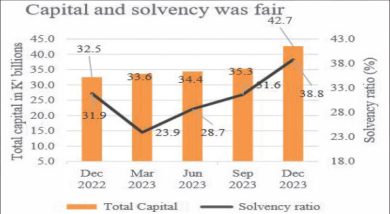Transparent institutions can stifle corruption
Malawi’s Corrupt Practices Act looks at the vice in much broader terms than mere giving or asking for a bribe. Such is the reason Anti Corruption Bureau (ACB) has a civic education unit to sensitise the public about dangers of corruption, not just arrests and court bail fights, much broader dimension. Nonetheless, there is a general feeling that corruption is a mere act of exchanging pieces of silver to influence certain outcomes.
Fact-minded brains can have a good time with the dictionary meaning of the word, but we can dwell on the institutional aspects that propagate it. I believe they are a key to any success in stopping the vice. Businesswise, corruption gives undue advantage to competitors, raising costs for those trying to trade fairly. It also keeps away potential investors who are afraid of paying high rents or bribes to get services critical to their business.
Given that corruption is a huge business cost, it is also important to understand why tales of corruption seriously continue to make rounds, years after institutions mandated to deal with it were established. The notion that cases involving senior politicians drag and eventually get buried while minnows are quickly prosecuted often sound true. But such is a mere public face of how we view corruption. Real stuff lies in how most public institutions have chosen to be less transparent after years of ‘democracy’.
Without pointing fingers at ACB or other related agencies, our fight against prostitution is hindered by a culture that lacks transparency, particularly in public institutions. Most public institutions have a laissez faire attitude in how they deliver services, fuelling corruption in the process because their clients are unaware of modalities involved in service delivery. While various institutions have made strides in reaching out to the public through spokespersons, the basics are not right. Spokespersons are merely reactive to journalistic inquests instead of taking leadership in sensitising the public on procedures to access public services. Public broadcasters have abdicated their rightful roles in sensitising citizens on how public services are delivered.
Various public institutions have been mentioned as corruption hotspots. Tales of corruption at the Ministry of Lands, Malawi Housing Corporation (MHC) and city councils with respect to land allocation are quite common. We have never seen these institutions publish in the media details of plots or land with their numbers allocated to specific individuals. Neither do we see their websites, assuming they work, to indicate that particular areas have been allocated to certain person or businesses.
Without playing blame game, such lack of transparency motivates certain elements of opportunistic crafty officers and rogue individuals to engage in corruption at the cost of the innocent public. Some homes destroyed in Area 49 were built by individuals that were duped simply because responsible institutions were not transparent in how they do their business. What a loss and a cost to both parties. Such are its fruits.
Information is a powerful tool and any lack of it, fuels corruption to levels that exist in our country. While it is easy to arrest a police officer for soliciting a bribe, I don’t think the average person in this country has any idea that police bail is free.
Yet, people still pay cops to get bail. The move taken by the Department of Immigration on how passports are issued is another good example how transparency helps reduce corruption. When the public is unaware of how public services can be accessed, a fertile ground to commit corruption related crimes is cultivated.
Some of the tax funded public institutions have never made themselves transparent in how they handle recruitment. The same can also be said about some big public companies trading on the Malawi Stock Exchange. Their recruitment practices remain shrouded in secrecy, adding impetus to cynical attitudes towards transparency by big businesses.
The ACB has been blamed for not biting enough, but success to fight corruption very much depends on how institutions commit themselves to a culture of transparency and accountability in their dealings. Putting in place an anti-corruption policy or dossier is of no consequence to stop the vice unless institutions non-discretionarily open up to all clients. By making transparency an integral part of their business, it can easily lead to fairness in how various clients are treated, politically connected or not.
 To some extent I am tempted to question what exactly the role of the Ministry of Information and Civic Education is. Is it a matter of news gathering through district information officers and recording presidential functions for the archives? Some proactive actions need to be taken to ensure that it takes a lead to ensure that public institutions, a beehive for corruption, are transparent in their dealings. It can even be a matter of Parliament passing necessary legislation or ministerial/Cabinet directives with respect to specific acts of Parliament that established parastatals. Otherwise, it is difficult to squarely put the blame on the ACB for lack of teeth if most public institutions remain ambivalent towards transparency. It makes a fight against corruption an exercise in futility.
 As long as we rank poorly on the international corruption index, our attempts to attract genuine investors will hit a snag. We may only succeed in inviting dubious tax avoiders to invest in Malawi, synonymous with foreign exchange externalisers.
Â




